HAIL TO THE
CHEF
By Andrew D. King
The next course has arrived on Boston's tables-a new wave of up-and-coming chefs who blend international cuisine with a nouveau American flair
Don't let the nickname fool you. "Beantown" is now one of the most sophisticated dining cities in the country, rivaling New York City, San Francisco and Chicago. Although steeped in Brahmin tradition and parochial-political bullheadedness, this town is in the midst of a culinary renaissance that transcends merely a strong economy and the trends that go with it.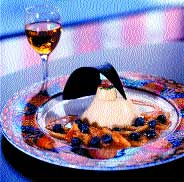
Fifteen years ago in Boston, you would have been out of luck if you suddenly got the craving for spicy cachaca marinated tuna from Brazil; similarly, you would have been hard-pressed to come across Mediterranean-inspired monkfish, mussel and clam stew with chorizo sausage and lobster broth; and certainly, you would have gotten strange looks if you asked around town for a dessert-only restaurant. Not anymore.
It wasn't long ago that chefs like Todd English of Olives, Jasper White of Legal Sea Foods, Lydia Shire of Biba, Frank McClelland of L'Espalier, and others, revolutionized the possibilities of fine dining in New England. Until then, Boston's restaurants were rooted firmly (with rare exception) in staples such as steak, fish and Italian cuisine from the North End. But ever since this clique of passionate and innovative chefs brought their New Food Order to the Hub, it's never been the same.
Today, they are still at it, as both executive chefs and as restaurateurs. But only now is their contribution becoming fully realized-as former students and proteges return to Boston to show what they've learned.
The examples are everywhere. Last year, Food and Wine magazine named Boston's Michael Leviton of Lumiere and Amanda Lydon of Truc two of the country's "Best New Chefs." The list goes on.
Panorama talked with six of the hottest up-and-comers of the local dining world, and asked them where they got their inspiration for bold and creative new ventures while preserving classical techniques for quality. What we found was a geographical and cultural potpourri among the lives and influences of these young chefs that gives new relevance to the notion of the American "melting pot."
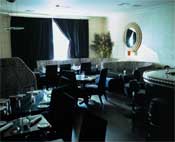
Nicole Coady of Finale, Michael Leviton of Lumiere, Geoff Gardner of Sel de la Terre, Christos Tsardounis of Aspasia, E. Michael Reidt of Bomboa and Anthony Susi of Sage, each personify the level of creative zeal that has helped put Boston on the international map of culinary excellence. But they are not the only ones.
Diners can expect to see new faces and places arrive as sure as the seasons. Aspiring chefs and former students continue to flock to Boston to realize their dreams.
There are dozens of other newcomers who have also started making headlines on the local and national dining scene. In addition to accolades from Food and Wine, Amanda Lydon, of French Provençal restaurant Truc (560 Tremont St., 338-8070) in the South End, was named "Best New Chef" last year by Boston magazine. Currently she is on sabbatical from all the media attention and considering where her newfound fame will take her next.
Those with a palette for Indian cuisine are thrilled to see the recent addition of Saffron's (279A Newbury St., 536-9766) contemporary Indian menu by acclaimed chef Olaf Niemier.
Robert Fathman, who made a grand appearance last year as executive chef at the posh new restaurant The Federalist at Fifteen Beacon Hotel has moved on to a smaller venue away from the limelight at Trio (174 Lincoln St., 357-5333) in the Leather District.
Speaking of The Federalist, look for new front-man Eric Brennan, whose previous experience in Boston includes Aujourd'hui at The Four Seasons Hotel.
Lively Southwestern cuisine came to the South End at Masa (439 Tremont St., 338-8884) last year, where chef Philip Aviles has been warming the taste buds of an increasing fan base. This list, of course, is not complete. It could change tomorrow. And that's the point-for food lovers, Boston is the place to be.
| Panorama's Special Chef Feature: Boston's Culinary Up-and-Comers |
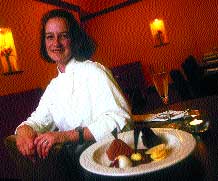 Nicole
Coady, Finale Nicole
Coady, FinaleShe was the outdoor type-a tomboy-climbing trees and getting muddy. "I was always getting in trouble. Good trouble," says Nicole Coady, executive chef at Finale (One Columbus Ave., 423-3184), who has been praised in Bon Appetit and Newsweek as one of the country's hot new chefs. These days she's in "good trouble" again, as the designer of decadent molten chocolate cake and creme brulee at one of the country's only upscale dessert restaurants. One of the first confections she ever made was an eclair when she was just 10 years old. "I baked it, cut it, then I said, 'What did I do? This thing is hollow.' I had no idea what it was. So I just tossed it." Of course, she had actually gotten it right (it just needed filling). And so it would be years before Coady discovered her talent almost by accident. "I had an aunt who had a bed and breakfast, and she called me one morning at 5 a.m. and said, 'I need help.' Then I started working for her regularly, and it dawned on me that I was enjoying what I was doing, and it blew me away that other people enjoyed it enough to pay for it." Coady earned both culinary and pastry degrees from Johnson & Wales University, but decided to stick with the sweet stuff because "the culinary stresses were unreasonable-that's why I chose pastry. You have to organize this stuff far in advance. I love the organization." As for her "research" for new desserts-like most artists, it comes from random inspiration. "It often ends up that I walk outside and see a really neat color, or find something reminiscent about a building's shape. Even the way people are dressed can influence me. You can take a small idea and turn it into a whole new thing." And that's exactly what she's done at Finale. |
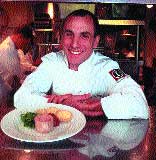 Michael
Leviton, Lumiere Michael
Leviton, LumiereMichael Leviton's resume is immaculate. His culinary adventures have taken him back and forth from prestigious restaurants in San Francisco to New York City, then back to local favorite Upstairs at the Pudding in Cambridge. Not that Leviton's looking for work. He and wife, Jill, have created Lumiere (1293 Washington St., West Newton, 244-9199), the quixotic French bistro that is "a culmination of everything that we've seen and liked." Others like it, too. Leviton was named one of the Best New Chefs this year by Food & Wine magazine. Leviton was influenced by his mother-sort of. "Mom wrote a cookbook when we were growing up called Kosher, Low Cholesterol Cookbook, which explains my love of pork and shellfish." For Leviton, forbidden food was attractive for its own sake. But through his experience, he was drawn to French cuisine, for its "precision and attention to detail. It strikes my soul." He and Jill, who runs the front of the eatery, were initially looking for a rustic, everyday restaurant, but "it turned out even more beautiful than we envisioned.I even avoided putting foie gras on the menu for nine months, until people just kept badgering us for it." The Levitons' success, admittedly, is due in part to the "control freak" in each of them. "It's very important that there be a rigid sense of coherence from the moment someone walks into the door to the moment they leave," says Leviton. His philosophy for all great food: "simplicity, purity, and cooking in harmony with the seasons-if you pay attention to all those things, it's going to be very difficult to screw up." Oh, and it doesn't hurt to be a creative perfectionist, either. |
 Geoff
Gardner, Sel de la Terre Geoff
Gardner, Sel de la TerreIf you're familiar with French cuisine in Boston, you've heard of L'Espalier. Owner and chef Frank McClelland's jewel in the Back Bay has been revered for years as the Hub's most elegant restaurant. His protege, Geoff Gardner, worked in L'Espalier's kitchen for almost nine years, until recently teaming up with his mentor as co-owner and executive chef at Sel de la Terre (255 State St. at Long Wharf, 720-1300). "The theme here is deliberately different than L'Espalier," explains Gardner. "We want Sel de la Terre to be much more rustic and casual, with a warm, inviting atmosphere at a moderate price point." The cuisine is Provençal, which Gardner says best suits his style. "I like the lighter, southern (France) styles. And you don't sacrifice any flavor, either. The flavors are bold, and lively and intense, with lots of olives and capers; pungent garlic; fruity olive oils, wines and liqueurs." Today, at Sel de la Terre, what makes Gardner so good is that continued obsession with flavor. "In order to serve food that tastes great, you have to taste it yourself. We do that constantly. The whole staff constantly has to evaluate the process of finding the right flavor." Before meeting up with McClelland, Gardner learned to be creative with food through his grandfather. "When I visited him as a kid, he would fix something I liked the first night, like pizza or hamburgers. Then, the next night, he would fix something that he liked, that I'd never tried before--like calves livers and blade steaks. He made it fun by not telling me what I was eating until after I tried it." Once he realized he wanted to pursue a culinary career, he went right for the top, knocking on McClelland's door at L'Espalier with an eager persistence. Then one day he got his chance to shine in the spotlight. |
 Christos
Tsardounis, Aspasia Christos
Tsardounis, AspasiaChef Christos Tsardounis' father is a native of Greece; and Tsardounis does great things with lamb and squid.But Aspasia (377 Walden St., Cambridge, 864-4745) "is not a Greek restaurant," even though its namesake refers to Pericles' wife. The menu at this highly-acclaimed neighborhood bistro showcases broad Mediterranean cuisine, as well as other internationally-inspired dishes. And it's no wonder. Tsardounis is a former student of both Todd English at Olives and Barbara Lynch at No. 9 Park, "who both have a very strong hand in innovative Mediterranean cuisine." Tsardounis showed early on that he was destined for a leadership role in the kitchen. Wife and business partner, Kathleen, remembers when they first met at Bertucci's Restaurant where she waited tables: "Here was this kid, 18 years old, and he was running the line, telling 30 year olds what to do-in a respectful way, of course." Tsardounis adds, "I think that started it all-to see someone like Joe Crugnale [owner of Bertucci's] start a business on a concept based on fresh ingredients-and it caught on." With this spark, Tsardounis entered the excitement of Olives in its heyday. "This is what I've been waiting for," Tsardounis said to himself once he arrived. "I was blown away.[English's] food is so bold and astonishingly robust." The cuisine at Aspasia is bold as well-and diverse. Tsardounis' mantra for good cooking is that "the dish has to be conceived-it has to be thought of-and the experiences of your life influence what goes on the plate." And with such a quaint setting, the chef says, "I have my hand on every dish." While, out front, Kathleen tries to "remember people by name and make them comfortable when they come in." With Tsardounis in the kitchen and Kathleen greeting their loyal customers, Aspasia is headed for greatness. If you don't believe us, just ask one of their biggest fans: the grand dame of cooking, Julia Child. |
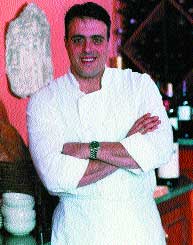 Anthony
Susi, Sage Anthony
Susi, SageIn the North End, old men still stand on the corner speaking Italian; narrow cobblestone streets twist through an Old World of mom and pop businesses; and the aroma of garlic and cappuccino permeates the streets where diners have gathered for almost 100 years to get a taste of authentic Italian cooking. Life here is founded on proud tradition and history-and so is the food. Before opening Sage (69 Prince St., 248-8814), awarded Boston's "Best New Restaurant 2000" by Boston magazine, Anthony Susi was born and raised right here in the North End, where, like most kids, he was into sports such as hockey and baseball. And just as ubiquitous as the Bruins and the Red Sox was the bustling food market. "I've been working with food since I was 14 years old. I used to help out at my father's butcher shop, Abbruzzese," says Susi, in a distinct Boston Italian accent. It wasn't long before Susi found himself established in the kitchens of two of the best restaurants near his stomping grounds, Davide and Mamma Maria. From there, Susi's passion took him back to the homeland. "I went to Italy for an entire summer where I got the chance to experience a lot of traditional Italian food." Now, however, "I refer to my menu as New American cuisine with an Asian influence," says Susi. As owner and chef at Sage, this local boy-cum-celebrity chef has added new spice to a neighborhood steeped in convention, with dishes like braised red snapper. This creative flair was encouraged while Susi worked under the "fiery personality" of Todd English at Olives. Despite the quaint setting and sophisticated cuisine at Sage, Susi's philosophy for good cooking remains simple: "respect your ingredients." |
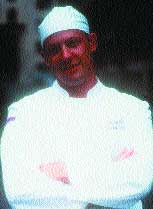 E.
Michael Reidt, Bomboa E.
Michael Reidt, BomboaHis mother used to advise him, "always make sure you love what you're doing." Michael Reidt listened well, and judging by the menu at Bomboa (35 Stanhope St., 236-6363), he is having a lot of fun, too. Reidt's avant-garde creations taste like the work of a French chef living in Rio de Janeiro. Whether you call his cuisine Nuevo Latino or Franco-Brazilian, the menu of this Lowell, Massachusetts native is certainly innovative. Like so many of his peers, Reidt has been shaped by the leadership of Todd English. "He infused a passion into me that I didn't realize I was missing. Until I was at Olives for six months, I would go home at night, and I would open up a cookbook or Food & Wine magazine, and suddenly I wondered, where did this come from? And then I realized, it was from Todd. Furthermore, he gave us [the cooks] incredible freedom. He'd come up with a special with three ingredients, and he'd allow you to come up with the plate. This allowed you to develop your sense of texture, your sense of flavor." After leaving Olives, Reidt departed on a "food sabbatical," which was more like wanderlust. "I got up on a Friday and told my mother I was moving to Hawaii on Tuesday. I packed up my Jeep Wrangler, and took off, making a big 'W' across the country. It was barbecue in Memphis, poor boys in New Orleans." Eventually, he met up with a friend in Hawaii, the place Reidt calls "Paradise." This love for the exotic grew when he met a woman from Brazil. "I am as much attracted to the culture as the food, and the passion these people have for everything." After a brief stint as chef at the former French bistro, Zinc, Reidt helped open Bomboa in the same location. Here, his pride and zeal meet with brilliant results, where he assures diners, "I put myself into every plate."  back to homepage |
| Say It Ain't So!: What would you be if you weren't a chef? | |
| Nicole Coady, Finale: | "Maybe I'd be a psychologist. I've always enjoyed helping people." |
| Michael Leviton, Lumiere: | "One time I considered leaving cooking, my father said I should go into emergency medicine. I do love that pressure; the sense of urgency." |
| Geoff Gardner, Sel de la Terre: | "I'd probably still be an undeclared college student." |
| Christos Tsardounis, Aspasia: | "I love music, but I don't have a gift for it. Maybe I'd be a food photographer." |
| E. Michael Reidt, Bomboa: | "No doubt about it. I'd be an engineer. I've been studying and taking pictures of Boston's new [cable-stayed] bridge every step of the way." |
| Anthony Susi, Sage: | "I'd be a rock star." |
| Kitchen Conundrums: Our chefs reveal their Culinary Pet Peeves | |
| Nicole Coady, Finale: | Everyone's using herbs in pastries. Eventually, you can only take this so far before it's a savory item and no longer a dessert." |
| Michael Leviton, Lumiere: | "When chefs forget the details. Season the food properly, and make sure there are salt and pepper shakers on every table." |
| Geoff Gardner, Sel de la Terre: | "I hate it when vegetables are absent from food. I miss them when they're not there." |
| Christos Tsardounis, Aspasia: | "Overmanipulated food-plates that have no real configuration-too much going on." |
| E. Michael Reidt, Bomboa: | "Respect the ingredients-a simple dish shouldn't take three days." |
| Anthony Susi, Sage: | "Chefs tables in the kitchen. Everyone should eat in the dining room." |